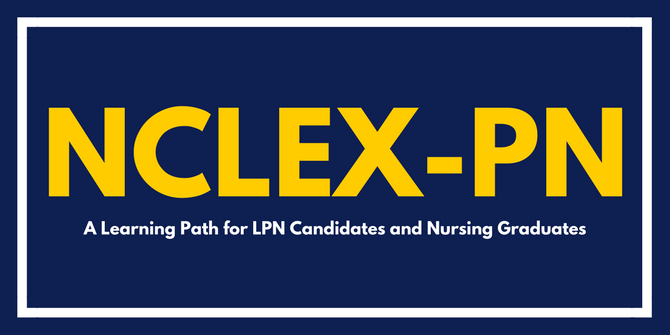Prepare for NCLEX-PN online using an online course. The full meaning of the exam name NCLEX-PN is National Council Licensure Examination for Practical Nurses. Its core focus is to determine the safety of allowing an individual to practice as an entry-level vocational or practical nurse. The test is sometimes referred to as the State Board or The Boards. The Board of Nursing has the mandate to protect the general public from ineffective and unsafe nursing care. In addition to this, each board is responsible for the regulation of the nursing practice in its jurisdiction. To know more about NCLEX, find the information at the official website.

Test Format
The framework of the NCLEX-PN exam is based on the ‘Meeting Client Needs’ structure. The test covers four major sections and sub-sections. The candidates should expect integrated content that covers medical, pediatric, surgical, obstetric, and psychiatric contents. It is designed in a multiple-choice format with four possible answer options. There are also alternate question types, such as multiple responses, hot spots, fill-in-the-blanks, drag and drop, and chart/exhibit. Irrespective of the number of questions you answer, you will receive pre-test questions, which do not count towards your NCLEX-PN result. These pre-test questions are usually used for a future exam. Every candidate has a maximum of five hours to complete all the questions, but there is no time limit for each of them. There is no compulsory break in the test, but the students can take an optional break after the first two hours of the exam and another break after another 90 minutes into the test Learn more about this website.
All candidates don’t end the exam at the same time. There are some factors that can signal the end of your test-taking. First, if you have demonstrated a minimum level of competency after answering the minimum number of questions. Second, if you demonstrate a lack of a minimum level of competency after answering the minimum number of questions. Third, if you have answered the maximum number of questions.
see also : Download Calibra wallet app for libra coin by Facebook
Test Structure
The NCLEX-PN exam is administered through a computer-based, computer adaptive test format (CAT). This is a test format that interacts with the candidates based on their answers to the questions. The CAT ensures no question is ‘too easy’ or ‘too difficult’ at any time. At the start of the exam, you will receive a relatively easy question, which is below the minimum level of competency. If you answer correctly, the computer will bring up a more difficult question. However, if you answer incorrectly, you will receive an easier one. This process continues until your attempt the maximum number of questions or the minimum to prove your competency level.
As it was mentioned, the NCLEX-PN exam content is based on ‘Meeting Clients Needs’. This is broken into four major categories, which include Safeand Effective Care Environment, Health Promotion and Maintenance, Physiological Integrity, and Psychosocial Integrity. Let us look at them in detail.
- Safe and Effective Care Environment
This section is divided into two components:coordinated care, and safety and infection control. The Coordinated Care covers the content areas that will be evaluated in this component of the exam, including Advanced Directives, Client Care Assignments, Concepts of Management and Supervision, Advocacy, Client Rights, Establishing Priorities, Informed Consent, Quality Assurance, Ethical Practice, Referral Process, Resource Management, Legal Responsibilities, and Continuity of Care.
The Safety and Infection Control covers a part of the exam questions. The nursing actions that will be evaluated in the test include Handling Hazardous Materials, Accident/Error Prevention, Home Safety, Security Plan, Incident Reporting, Standard/Transmission-Based and other Precautions, Medical and Surgical Asepsis, Safety Devices, and Use of Restraints.
- Health Promotion and Maintenance
The questions in this category evaluate nursing contents, such as Ante/Intra/Postpartum and Newborn Care, Developmental Stages and Transitions, Data Collection Techniques, Immunizations, Lifestyle Choices, Disease Prevention, Health Promotion Programs, Self Care, and High Risk Behaviors.
- Psychosocial Integrity
This category measures the candidate’s skills in the areas of Coping Mechanisms, Mental Health Concepts, Sensory/Perceptual Alterations, Spiritual Influence on Health, Stress Management, Therapeutic Communication, Behavioral Management, End of Life Care, Support Systems, and Crisis Intervention.
- Physiological Integrity
This section is further broken into four components:
- Pharmacological and Parenteral Therapies: The areas to be tested under this topic involve Expected Effects, Pharmacological Pain Management, Adverse Effects, and Side Effects.
- Basic Care and Comfort:It evaluates knowledge in Assistive Devices, Mobility, Elimination, Nutrition and Oral Hydration, Rest and Sleep, and Non-Pharmacological Comfort Interventions.
- Physiological Adaptation: This areais dedicated to some nursing actions, which include Basic Pathophysiology, Unexpected Response to Therapies, Medical Emergencies, Alteration in Body System, and Electrolyte and Fluid Imbalances.
- Reduction of Risk Potential: The content to be evaluated under this component includes Laboratory Values, Diagnostic Tests, Vital Signs, and Therapeutic Procedures.
TestScoring System
The NCLEX-PN exam has no numerical score. It is either you pass or fail it. The decision on the outcome of your test is made at the end of it. However, you will only be notified of your result in about two to six weeks after your exam. If you don’t pass the test, you do not have to despair. There are many other students who do not pass their exam at their first attempt. When you receive your result, you will also receive a diagnostic profile if you fail the test. The profile will offer you a detailed explanation of your test performance. Go through this report to know how many questions you answered during the exam. To be prepared, you can use practice tests. You can retake the exam 45 days after your initial exam administration.